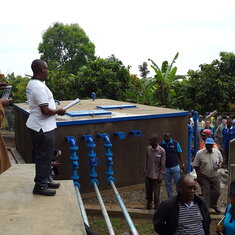Pagecontent
Small Town Water Supply
At a recent monitoring visit to Mbarara, Christine Nabacwa, Programme Manager, and Günter Engelits, ADA-office in Kampala, reviewed the financial management and procurement practices of project staff to check for compliance with project terms and conditions and government regulations. This happened in the town of Nyahuka, located in Bundibugyo district in Western Uganda. It was noted that despite the generic challenges of low internet connectivity, the project staff on the ground are quite knowledgeable in their various skill fields. The project will exceed its planned target in the region.
The project emphasises appropriate designs and technologies to ensure that water is affordable even for the poorer sections of the communities served. This is achieved through a rigorous design review process and constant community participation and communication at every stage of the town water supply development.
Technical assistance plus support
The structure is developed by two Water and Sanitation Development Facilities (WSDFs) under Uganda’s Ministry of Water and Environment. This is part of the project setup, water supply and sanitation infrastructure, including set up of the associated management. Technical assistance plus support to visibility and monitoring aspects are handled directly by ADA.
Günter Engelits praised the good work achieved under the project but cautioned the project staff to improve on the efficiency of service provision. “Sustainability is not only about securing funding from donors and generating sufficient income from water sales. It is first and foremost about economical management in order to maintain trust of your water users, of government, of the Ugandan taxpayers and of donors” said Engelits.
Christine Nabacwa applauded the good cooperation with the local leaders which had led to timely fulfilment of all community obligations, including acquiring land for the water supply installations and maintaining high standards of hygiene and sanitation. She cautioned the community to safeguard their resource by taking on environmental protection activities. “Bundibugyo district has already experienced the effects of climate change by way of landslides caused by unusually heavy rains; these have damaged infrastructure including bridges and roads. It is critical therefore for communities to implement improved land use and management practices to guarantee the sustainability of the water resource”.
Benefit for the community
The community members, who were represented by the Water and Sanitation Committee, expressed satisfaction with the quality and level of progress achieved. In addition, the contractors were commended for their cordial relations with the local government and community. The committee also confirmed the incorporation of cross cutting issues like gender mainstreaming, HIV/AIDS prevention campaigns, mobilisation for commercial use of water, transparency and equitable provision of services to all community members.
After three years of implementation, 289.000 people have so far received access to safe water supply plus improved household and public sanitation facilities. The project cost is 33.9 million euros out of which 30.5 million euros is provided by the European Union under the Millennium Development Goals (MDG) Initiative. The initiative was set up to fast-track achievement of the slow moving MDGs and is funded through the 10th European Development Fund (EDF). The EDF is the EU's main instrument for providing development aid to African, Caribbean and Pacific (ACP) countries and to overseas countries and territories (OCTs).


